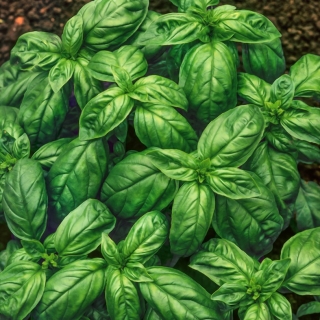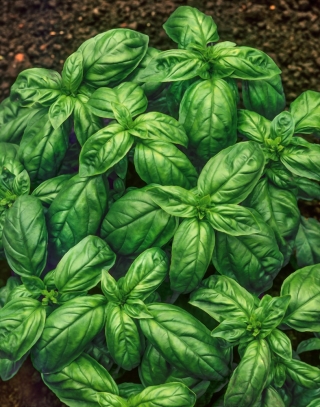Sweet basil, also called Genovese basil, is a variety that produces medium-sized, green, shiny leaves that densely cover the stalks that are square in cross section. These aromatic greens are perfect for salads, casseroles, soups and sauces. They also emphasize the taste of fish and poultry dishes. First and foremost, they are an irreplaceable addition to tomatoes in any form. Basil plant grows up to 30 -50 cm tall. It can be grown in the ground from direct sowing or from seedlings. You can also easily grow lush bushes in containers on the balcony or kitchen window. Basil is used fresh, dried, frozen and in extracts.
The basil requires a sheltered, sunny site. The soil must be permeable and constantly, slightly moist. High nutrient content is also of essence. Basil cultures must be regularly weeded. Since these plants do not tolerate low temperatures they may be cultivated outdoors only after the second half of May. We recommend to pinch the tips of the shoots - the plants will grow much better. The green tops obtained that way can be used in the kitchen on a regular basis.
Seeds need to sown in containers in March and April. Press them gently into the soil. Foil can be used to speed up germination. The optimum germination temperature is quite high, between 25 and 28⁰C. The emergence takes place after 3-5 days. Spacings of 45 x 30 cm are required for optimal plant development.
Sweet basil is a great herb that can be used in a variety of ways. It has a calming and antidepressant effect and soothes insomnia. Might also help cure inflammations thanks to its anti-bacterial properties.
One package contains 50 g of seeds of the sweet (Genovese) basil. A growing guide and the sow-by date were printed on the package.
- Weight: 50 g
- Height: 30 - 50 cm
- Use: Herb - fresh, dried or frozen
- Foliage: shiny, medium sized, green leaves
- Site: sheltered, sunny; permeable, moist, fertile soil
GardenSeedsMarket - has been in business for more than a decade and from the very beginning we have made the quality of our products the top priority. Throughout the years we have delivered the best quality goods to tens of thousands of customers from all over the world. Their satisfaction proves that we had chosen the right way.
All seeds we sell are subject to a multi-level quality control checks and only then are carefully packed and dispatched. Our products have been awarded numerous certificates and comply with the highest standards of the European Union. Our employees are experienced gardeners who are more than happy to answer your every question.
Where do our seeds come from?
All of the seeds sold in our shop come from the best producers from across the European Union. Thanks to a long-standing cooperation with them we were able to develop the most adequate storing and dispatch conditions, guaranteeing that you always receive fresh and carefully tested batches of seeds. Exclusion of the middlemen from the whole process not only makes it possible for us to avoid sending out-of-date seeds that might have been lying too long on a warehouse shelf, but also ensures the most attractive price for top quality products.
The quality control process
All our seeds must pass a four-stage quality control process.
Stage one begins with a careful selection of the suppliers. Than we proceed with controlling their crops, foreign producers are not excluded from the quality control process. Plants are checked at every stage of their development: when they start to grow, during blooming and when they start bearing fruit (seeds). At this stage the most important thing is to ensure proper spacing of the plants. Thanks to that obtaining the desired morphological characteristics of each particular species or variety, such as colour, height and shape, can be ensured.
Stage two consists of a detailed verification tests in laboratory conditions. With the use of the highest quality equipment by the highly qualified staff, our suppliers perform more than 30 000 quality checks annually. The seeds that do not meet our requirements are subject to technological refining processes, including drying, cleaning, upgrading and testing again.
Stage three starts with sowing seeds in selected control plots. That way we obtain valuable, exact information concerning their germination that must be maintained at an appropriate level. Simultaneously, the varietal identity of each species is checked at this stage.
Stage four takes place in our warehouses and consists of eliminating seeds that have been stored for too long on our shelves and replacing them with new batches. Each package is stamped with a unique batch number and also with the sow-by-date.
All four stages combined allow us to state with confidence that the seeds we deliver comply with the highest standards and have completed all required control stages with flying colours.
Prizes and awards
The seeds we sell are widely recognized for their quality and have won many awards. Our seeds won numerous gold medals and distinctions for their high quality. The World of Flowers was also honoured for its innovative approach.
Among those awards there were: TOP INNOVATION (June 2015), GOLD MEDAL AT THE POZNAN INTERNATIONAL FAIR (2015), CONSUMER QUALITY LEADER (2014), FARMER OF THE YEAR (2014).
In addition, we have also been awarded the “IDEAL BUSINESS” certificate for two years in a row.
Germination
We are committed to selling only the highest quality seeds. Taking into consideration the efforts we make daily, please also note that plants are living organisms and their germination and growth depends on many factors, such as temperature, soil type, humidity and the frequency with that they are watered, sowing time and conditions, use of fertilizers and plant protection agents (pesticides), as well as weather and climate conditions. We provide help by sharing the accurate and up-to-date sowing and growing information, however, we cannot bear any responsibility for the plants that were not cultivated in conditions appropriate for given species.







